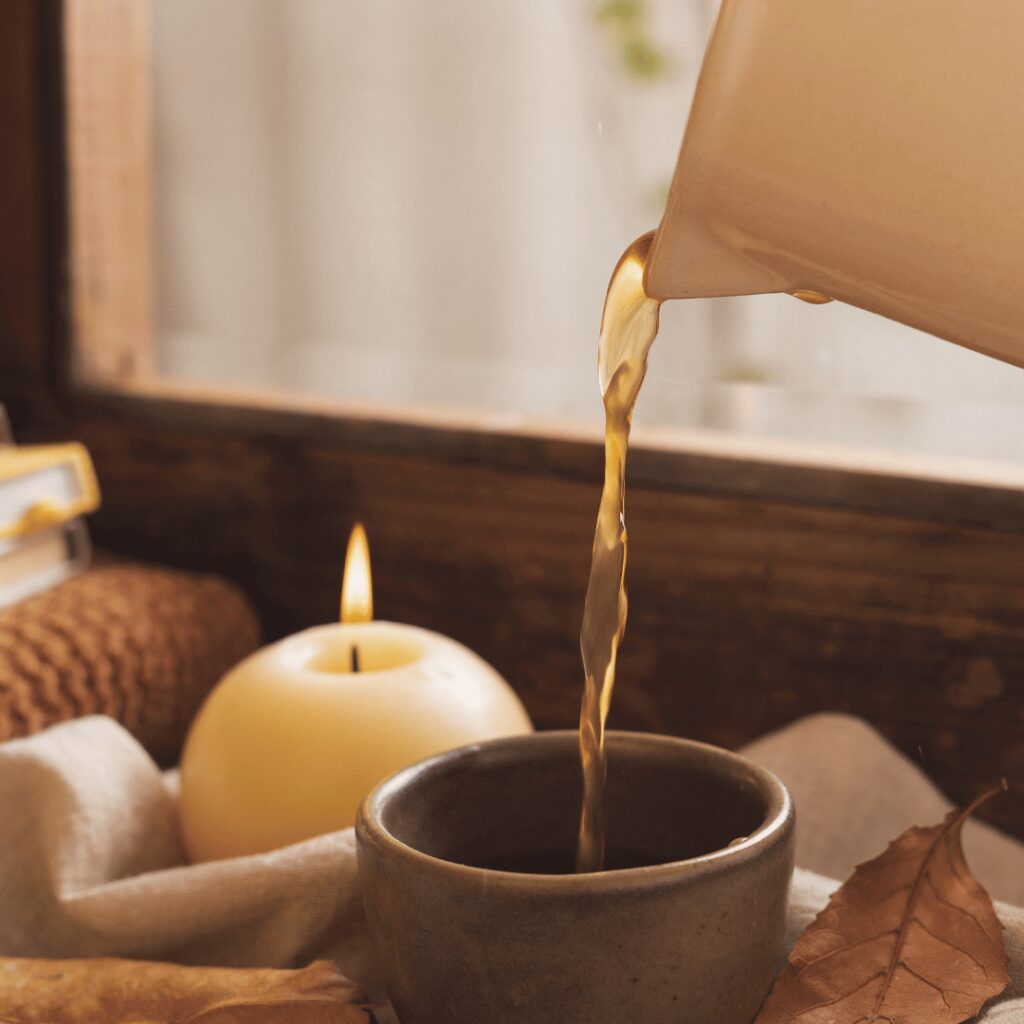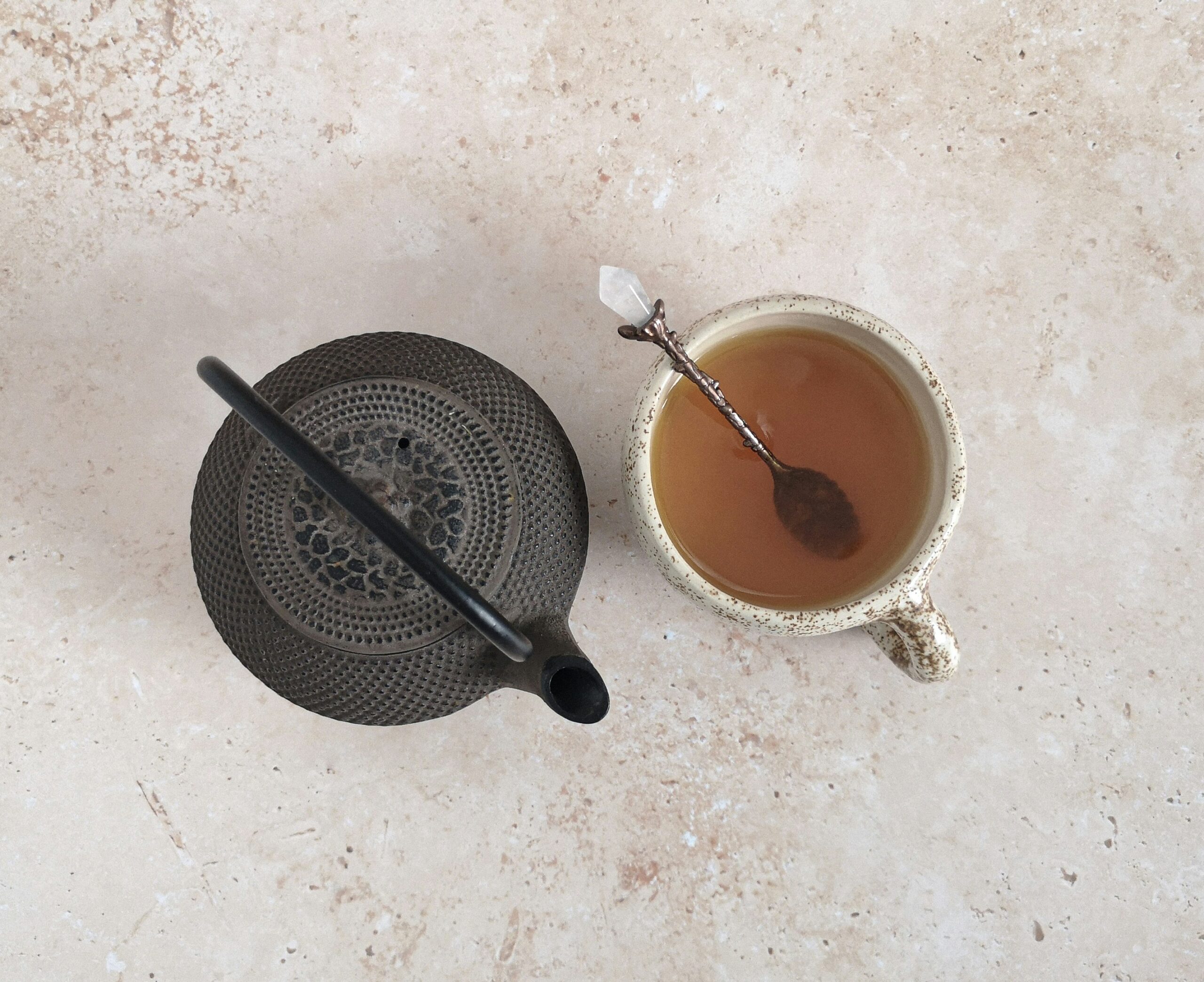
Herbal teas have done wonders in boosting my overall health and wellness. And it should be no surprise since that is what I am currently studying! I thought to open the doors on how the ideals of herbal teas came to be, what the science is saying in terms of the benefits it can provide for us and what are some of the ones as easy as accessible in either your kitchen cabinet already or local grocery store.
I think it’s important to acknowledge its origins as well as fact-based findings that are currently present as it provides a clearer notion of how it can integrate into our everyday lives. You may have heard anecdotal evidence of herbal teas benefiting everyday lives. But I think it’s also just as important to delve into what the literature says so that you can make an informed decision if it’s something you wish to dabble or adopt. So grab a cup of tea and hopefully, this article here provides a starting point for you!


For generations, various cultures have leveraged the power of herbal infusions to promote health, soothe ailments, and enhance well-being. Ranging from the calming effects of chamomile to the invigorating properties of peppermint, herbal teas offer a natural and holistic approach to managing your health.
Understanding how to select and prepare herbal teas is key to maximising their potential benefits. Quality ingredients and proper brewing techniques can change not only the flavour profile but also the efficacy of the tea. Whether you’re unwinding with a warm mug after a long day or seeking specific healing properties, developing a personal herbal tea ritual can be both therapeutic and gratifying.
Key Takeaways
- Herbal teas have a long-standing history in promoting health and treating ailments.
- Selection and preparation of herbal tea can significantly influence its healing potential.
- Incorporating herbal tea into daily routines can provide a comforting and healthful practice.
What are we discovering today?
- Historical use of herbal tea
- Popular herbal teas – camomile, ginger and peppermint
- How to best prepare herbal tea
- Blending herbal teas
- What to be wary of when consuming herbal teas
- Creating herbal tea rituals
- General herbal tea FAQs
Did we miss any topics you would like us to cover? Shoot us a comment below!
Historical Use of Herbal Tea
Herbal tea has served as the centre of health and healing for centuries.
Herbal tea used as remedies in ancient times
In ancient times, herbal teas were not only consumed as a drink, they were used as form of medicine. Egyptians used them to treat health problems over 5,000 years ago, like using peppermint tea for stomach issues. Similarly, Chinese emperors drank specific herbal teas to live longer and for good health, starting from 2737 BC. The story of Cape herbal teas shows how important these teas were for daily life and health.
Herbal tea as part of cultural significance
Herbal teas are not just for healing; they are also part of many cultural traditions. They are often used to show hospitality and respect, like in African and Middle Eastern welcome ceremonies. The book of herbal wisdom: using plants as medicines shows how these traditions value nature and its role in human health.
Popular Herbal Teas
Clinical research is another form of supporting evidence in addition to anecdotal evidence on demonstrating the benefits of Herbal Teas. According to an article on Herbal teas and their health benefits, there are significant amount of people who are advocates of herbal teas, but there aren’t many articles that show if they’re safe and really work. As more resources are put into further research, this may perhaps strengthen the ties between herbal teas and health.
I’ll now introduce you to some herbal teas that you can easily locate in your local grocery store but may not be aware of their health properties. I’ll also highlight what some of the studies are presenting regarding the herbal tea in question if you’re interested! Keep scrolling!

#1
Camomile Tea for relaxation
Chamomile tea is known for helping you feel calm. There’s a lot of products popping up on the market highlighting this as a key ingredient (I’ll be doing a spotlight on those soon – watch this space!). It’s a good pick when you want to chill out after a busy day or get ready for bed.
It has also been traditionally used to relieve other ailments such as hay fever, inflammation and even menstruation.
But what does the science say about the effectiveness of camomile tea?
A study on human volunteers indicated that chamomile flavonoids and essential oils can penetrate into the skin’s surface , making them useful as topical anti-inflammatory agents.
As a sleep inducer, Chamomile is thought to have such sedative effects as highlighted in research finding that it is most likely due to a chemical compound called apigenin found in this herb that binds to a certain receptor in the brain that triggers this process.
#2
Ginger Tea for immunity
So this is one of my personal faves. This spicy root not only warms you up, but also provides anti-inflammatory benefits and may help fend off colds. Ginger tea can serve as your warming ally in supporting a robust immune response – quite handy during a cold day!
From scientific standpoint, studies are pointing to favourable outcomes when it comes to Ginger and health more so for its It also has anti-inflammatory (which is great for post-workout muscle pain) and anti-oxidative properties for mitigating aging. Further research is required but based on preliminary studies – it does appear to be promising.
#3
Peppermint for digestion
Drinking peppermint tea may benefit your digestion. This minty beverage is may be particularly useful if you’re dealing with indigestion or bloating. The natural compounds in peppermint promote smoother digestion and may reduce stomach discomfort. There’s a lot of articles online depicting health benefits of peppermint and digestion however from a medical study perspective – the evidence is still quite limited especially where clinical trials on humans. However there are quite a number of ancient texts and anecdotal evidence supporting its health benefits so it’s definitely a one to watch.
How To Best prepare herbal teas
Understanding the correct preparation techniques is crucial to really harness the most out of your herbal teas. Each step, from choosing the appropriate brewing method to combining herbs for maximum effect, plays a vital role in creating a potent and therapeutic cup of tea.
Brewing methods for preparing herbal teas
#1 Infusion
The most common method for brewing herbal teas involves steeping loose herbs in boiled water for a specific duration. Typically, this steeping process lasts about 5 to 10 minutes. However, certain leaves or flowers, like those from the tea plant known as Thea folium, might need different steeping times to fully extract their benefits. Best to follow brewing instructions.
#2 Decoction
To extract active compounds from tougher herbs like roots or bark, you can use a decoction method. This involves simmering the parts in water for around 20 to 45 minutes. The longer cooking time is necessary to break down the tougher cell walls and release the active compounds found in these tougher herbs.
Blending herbal teas
When creating a therapeutic blend, consider the flavour profile and health benefits of each herb. Like building out a recipe, find first a base like green tea or chamomile, then add complementary herbs. Ensure you use appropriate ratios, which can be found in resources like The Green Pharmacy – because there can be potential harmful risks when concocting your own, especially potent herbs.
Also it is worth mentioning to be aware of the potential interactions with your health conditions or medications. Always consult a healthcare professional about the suitability of specific herbs. Which brings me to the next section.
What to be wary of
While indulging in the soothing and beneficial world of herbal teas, it’s crucial that you are also mindful of any potential risks. To ensure that the inclusion of herbal teas into your health regimen is beneficial and safe, it’s essential to be aware of your body’s responses, possible allergies, and potential interactions with any medications you might be taking. Always remember, the aim is to augment your wellness journey with these natural infusions, not to compromise it. Therefore, if you’re uncertain about the suitability of specific herbs or the combinations you’re consuming, it’s best to consult with a healthcare professional.
Allergies and Side Effects
It’s important to be aware that herbal teas can potentially trigger allergic reactions or side effects in some individuals. For example, chamomile tea, which is well-known for its calming properties, can cause allergic reactions in people who are sensitive to the daisy family. Pay close attention to how your body reacts after drinking herbal tea and seek medical advice if you experience symptoms such as rashes or difficulty breathing.
Interaction with Medication
Herbal teas may interact with prescription medications, potentially impacting their effectiveness. Some herbal teas are known to interact with blood thinners and blood pressure medications. For instance, St. John’s Wort can notably alter the metabolism of certain drugs. Therefore, it’s essential to discuss your herbal tea intake with your healthcare provider, particularly if you’re taking medication.
Creating Personal Herbal Tea Rituals
Embarking on a journey to craft your personal herbal tea rituals allows self-care and tradition to intertwine harmoniously. These rituals become a nexus for tranquillity and health, evolving into a cherished part of your daily routine. The process of creating a herbal tea ritual is not just about brewing and consuming the tea but extends to the selection of herbs, the actual preparation, and the environment in which you enjoy your cup.
Firstly, you need to select your herbs wisely. Choose herbs that align with your health and wellness goals. If relaxation is your aim, consider chamomile or lavender. For a gentle energy boost, ginseng or green tea might be ideal.
Next comes the timing of your tea. Assign specific times for your tea rituals. This could involve a cup of peppermint tea in the morning to invigorate your senses, or a soothing valerian blend before bedtime.
Also important is the creation of a comforting space. Establish a corner of your home where you can sip your tea undisturbed. This could be a cozy armchair by the window or a peaceful spot in your garden.
The act of preparing your tea is as crucial as drinking it. Heat your water to the right temperature and steep your herbs for the perfect amount of time. Embrace this process as a moment of mindfulness.
During your ritual, make sure to engage all your senses. Focus on the aroma, taste, and warmth of the tea. Notice the subtle flavors as you sip slowly, grounding yourself in the present moment.
Lastly, you could journal your experiences. Keep a record of the blends you’ve tried, how they made you feel, and any changes in your well-being over time.
Remember, these rituals are deeply personal and can evolve over time. Enter this practice with an open mind and heart, and let the holistic power of herbal tea become a cherished part of your wellness journey.
Read more on our article how to add mindfulness to your routine … it’s a good one.
General Herbal Tea FAQs
Uncovering the rejuvenating properties of herbal teas can be an enjoyable journey towards wellness. Let’s delve into how these natural infusions can meet your health needs by addressing some common questions.
What are the most beneficial herbal teas for overall health?
It’s always good to take care of ourselves and our health. Herbal teas, such as green tea and chamomile tea, can be a great addition to your daily routine. Green tea is packed with antioxidants which can help fight against oxidative stress and improve your overall well-being. Chamomile tea, on the other hand, is known for its relaxing and sleep-promoting effects, which can be a great way to unwind after a long day. So, why not give these teas a try? Your body and mind will thank you for it!
How can drinking herbal tea contribute to wellness and healing?
I understand that taking care of one’s health and well-being can be challenging at times. However, incorporating herbal tea into your daily routine can be a simple and effective way to improve your overall wellness. By providing hydration, vitamins, and minerals, some herbal teas can even support your immune system, improve digestion, and alleviate stress. I hope this information helps you in your journey towards a healthier and happier life.
Which herbal teas are recommended for daily consumption to promote health?
Taking care of your health is important, and small changes can make a big difference. If you’re looking for a way to promote your well-being, you might want to consider adding some peppermint or ginger tea to your routine. These teas are not only comforting but also have promising properties to alleviate digestive and anti-inflammatory ailments when consumed regularly. Give yourself the gift of wellness, and try incorporating these teas into your daily routine.
What are the top herbal teas for boosting immunity and how effective are they?
I completely understand how important it is to take care of our immune system. Herbal teas such as ginger have some evidence supporting their immune-boosting properties, thanks to the compounds they contain. While they are not intended to replace medical treatment, they can certainly be a beneficial addition to a healthy lifestyle.
Can herbal teas provide relief from common ailments and which ones are best for this purpose?
It’s tough to deal with various ailments, but herbal teas can be a great source of relief. Chamomile can help with stress and sleep issues, while lemon balm can help with cold and flu symptoms due to its antiviral effects. However, it’s always important to consult a healthcare provider. Take care of yourself, and don’t hesitate to seek professional help when you need it.



Comments +